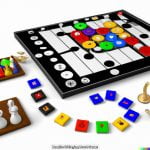Are you looking for a fun and engaging way to challenge your mind and connect with others? Then look no further than the world of strategy board games.
From classics like chess and Scrabble to modern favorites like Settlers of Catan and Ticket to Ride, strategy board games offer a wide range of benefits that go beyond mere entertainment. In this article, we will explore the numerous advantages of playing strategy board games, from mental stimulation and strategic thinking to social interaction and stress relief.
Strategy board games are more than just a pastime – they provide a wealth of cognitive benefits that can have a positive impact on your mental acuity. By engaging in strategic gameplay, players can enhance their critical thinking skills, improve their memory, and sharpen their problem-solving abilities. Whether you’re plotting your next move or strategizing to outwit your opponents, the mental challenges presented by strategy board games offer an enjoyable way to stay mentally sharp while having fun.
In addition to the cognitive benefits, playing strategy board games also fosters strategic thinking and decision-making skills. Players must analyze the game situation, anticipate their opponent’s moves, and make calculated decisions in order to succeed.
This process helps develop valuable skills that can be applied to real-life situations, such as evaluating options, weighing risks, and making informed choices. With these benefits in mind, it’s clear that strategy board games offer much more than just entertainment-they provide a pathway to personal growth and development.
Mental Stimulation
In today’s fast-paced world, finding ways to challenge and stimulate our minds is essential for maintaining cognitive sharpness. Strategy board games offer a fun and engaging way to exercise our mental faculties while enjoying quality time with friends and family. The benefits of playing strategy board games go beyond mere entertainment, as they can have a positive impact on our cognitive abilities.
Enhanced Problem-Solving Skills
One of the key benefits of playing strategy board games is the improvement of problem-solving skills. Games like chess, Settlers of Catan, or Risk require players to anticipate their opponent’s moves, devise creative strategies, and adapt to changing game situations. This constant need to assess possibilities and make decisions on the spot can lead to improved problem-solving abilities in real-life scenarios.
Improved Memory and Cognitive Function
Engaging in strategy board games also helps enhance memory and overall cognitive function. Whether it’s recalling past game moves, tracking opponents’ actions, or remembering specific game rules, players must exercise their memory throughout the game. Additionally, the strategic thinking required in these games stimulates brain activity, leading to improved cognitive function over time.
Boosted Critical Thinking Skills
Another significant benefit of playing strategy board games is the development of critical thinking skills. Players are constantly analyzing various factors such as risk assessment, resource management, and long-term planning to achieve their goals within the game. This constant exercise in critical thinking can have a positive impact on decision making and analytical reasoning skills outside of the game environment.
Strategic Thinking
Playing strategy board games offers numerous benefits, one of which is the improvement of decision-making skills. Whether it’s deciding on a particular move, weighing options, or anticipating the opponent’s next move, strategy games require players to think critically and make informed decisions. This mental exercise not only sharpens the mind but also hones strategic thinking, which can be applied to real-life situations.
Research has shown that playing strategy board games can enhance cognitive functions such as problem-solving and logical reasoning. Games like chess, Settlers of Catan, and Risk encourage players to consider various possibilities and outcomes before making a move, thereby strengthening their ability to make sound decisions. These cognitive benefits extend beyond the gaming table and can positively impact an individual’s analytical skills in professional and personal settings.
Furthermore, strategy board games provide a safe environment for individuals to practice decision-making without real-life consequences. By engaging in these games, players learn how to weigh risks versus rewards and adapt their strategies based on changing circumstances. This exposure to complex decision-making scenarios can help individuals become more adept at handling uncertainty and making calculated choices in their daily lives.
| Benefits of Strategy Board Games | Improvement in Decision Making Skills |
|---|---|
| Mental Stimulation | Enhances cognitive functions such as problem-solving and logical reasoning. |
| Strategic Thinking | Encourages critical thinking and the ability to make sound decisions. |
| Risk Management | Teaches how to weigh risks versus rewards and adapt strategies based on changing circumstances. |
Social Interaction
Building Relationships
Playing strategy board games with friends and family can be a great way to strengthen relationships. Whether it’s a regular game night with close friends or a family gathering, board games provide an opportunity for bonding and creating lasting memories. By engaging in friendly competition and cooperation, players can build stronger connections and develop a deeper understanding of each other’s personalities and playing styles.
Improving Communication
Strategy board games also offer the benefit of improving communication skills. Players need to effectively communicate their strategies, negotiate partnerships, and make joint decisions in order to succeed in the game. This promotes healthy communication habits and teamwork, which can positively impact relationships beyond the gaming table. Additionally, discussing the game’s intricacies and outcomes afterwards can further enhance communication skills and foster meaningful conversations.
Fostering Community
Participating in strategy board games can also lead to forming new friendships within gaming communities. Whether it’s joining a local board game club or attending gaming events, players have the opportunity to connect with like-minded individuals who share their passion for strategic gameplay. These social interactions not only provide a sense of belonging but also create opportunities for personal growth and networking.
Stress Relief
Amidst the hustle and bustle of everyday life, finding effective ways to unwind and alleviate stress is crucial for maintaining mental well-being. Strategy board games have been found to offer therapeutic benefits, providing individuals with a much-needed escape from the pressures of daily life. Engaging in a game that requires strategic thinking, problem-solving, and decision-making can serve as a form of relaxation and distraction from stressors.
One of the main benefits of playing strategy board games is their ability to divert attention away from sources of stress. Focusing on the game at hand allows individuals to temporarily set aside their worries and concerns, promoting a sense of mental ease and tranquility. Moreover, the social aspect of playing these games can also contribute to stress relief by fostering feelings of camaraderie and connection with others.
Furthermore, the cognitive engagement required in strategy board games can promote mindfulness and present-moment awareness, which are essential components in stress management. By immersing oneself in the intricacies of gameplay, individuals are able to shift their focus away from stressful thoughts or problems, allowing for a welcome respite from anxiety and tension. As a result, regular participation in strategy board games can be an effective tool for combatting stress and enhancing overall well-being.
Educational Value
Playing strategy board games offers a multitude of educational benefits for individuals of all ages. One of the key advantages is the enhancement of critical thinking skills, as players are required to analyze different scenarios, make decisions, and anticipate the potential consequences of their actions. This type of cognitive stimulation not only improves problem-solving abilities but also promotes logical reasoning and strategic planning.
Moreover, strategy board games provide an excellent platform for learning various academic concepts such as mathematics, history, and geography. For example, games like “Risk” can teach players about world geography and geopolitical strategies, while “Chess” involves mathematical thinking and spatial reasoning. By incorporating educational elements into gameplay, players have the opportunity to expand their knowledge in a fun and interactive way.
An additional benefit of playing strategy board games is the development of social skills. Through cooperative play or friendly competition, individuals learn how to communicate effectively, work as a team, and engage in healthy interactions with others. These social interactions not only contribute to personal growth but also create a supportive and engaging environment for learning.
| Educational Benefits | Examples |
|---|---|
| Enhancement of critical thinking skills | Analyzing different scenarios in games like “Settlers of Catan” |
| Academic learning opportunities | Learning about world geography and geopolitics through games like “Risk” |
| Development of social skills | Fostering communication and teamwork during cooperative gameplay |
Family Bonding
Playing strategy board games with family members can be an enjoyable and rewarding experience that strengthens bonds and creates lasting memories. Here are some ways in which engaging in these games can enhance family relationships:
- Encourages Quality Time: Strategy board games provide an opportunity for families to disconnect from electronic devices and spend quality time together. This shared experience fosters communication, collaboration, and a sense of togetherness.
- Promotes Healthy Competition: Board games encourage friendly competition among family members, teaching important lessons about sportsmanship, fair play, and graceful winning or losing. These experiences help build resilience and emotional intelligence in individuals.
- Enhances Problem-Solving Skills: Many strategy board games involve critical thinking and decision-making, requiring players to think ahead and consider various outcomes. By engaging in these cognitive challenges together, families can foster a supportive environment for learning and growth.
Overall, the benefits of playing strategy board games with family members go beyond simply having fun; they create opportunities for bonding, personal development, and meaningful connections. So whether it’s a weekly game night or a special occasion, gathering around the table for some strategic gameplay can greatly enrich the familial relationship.
Time Management
When it comes to playing strategy board games, one of the often overlooked benefits is the improvement in time management skills. The concept of patience and planning are crucial elements of many strategy games, and as a result, players can learn to effectively manage their time both in the game and in real life.
Some of the key ways in which strategy board games teach time management skills include:
- Strategic Planning: Players must carefully consider their moves and plan ahead to achieve their objectives, teaching them the importance of thinking ahead and being proactive.
- Resource Management: Many strategy games involve managing limited resources efficiently, helping players develop a mindset for making the most out of what they have, which translates into better time management skills.
- Persistence and Patience: Strategy board games often require players to endure setbacks and work towards long-term goals, encouraging them to stay patient and dedicated over an extended period – a valuable skill in time management.
In addition to these specific time management skills, playing strategy board games also provides a practical way for individuals to practice patience and planning in a fun and engaging manner. By incorporating these games into their leisure activities, individuals can sharpen their time management abilities without even realizing it. Overall, the benefits of playing strategy board games extend beyond just entertainment – they serve as valuable tools for developing essential life skills such as patience and planning.
Conclusion
In conclusion, strategy board games are not just a source of entertainment, but they also offer numerous benefits for individuals of all ages. The cognitive benefits of playing these games can help improve mental stimulation and enhance decision-making skills. Furthermore, the social interaction and communication fostered through board games can strengthen relationships and create lasting bonds with friends and family.
One of the most significant benefits of playing strategy board games is the opportunity for educational growth and learning. These games provide a platform for individuals to develop critical thinking, problem-solving, and strategic planning skills in an engaging and enjoyable manner. Additionally, the therapeutic effects of board games can provide stress relief and promote overall well-being.
Moreover, the time management skills honed through playing strategy board games can have a positive impact on everyday life, teaching patience and enhancing planning abilities. By embracing the many advantages that come with playing these games, individuals can lead a well-rounded lifestyle that promotes mental acuity, social connections, and emotional wellness. Overall, strategy board games offer a myriad of benefits that contribute to personal development and enjoyment in various aspects of life.
Frequently Asked Questions
Are Strategy Board Games Good for Your Brain?
Strategy board games are indeed good for your brain. They require critical thinking, decision-making, and planning skills, which can help improve cognitive function. Players need to adapt to changing circumstances and anticipate their opponent’s moves, all of which stimulate the brain.
Why Is Strategy Important in Board Games?
Strategy is crucial in board games because it requires players to think ahead and consider various possible outcomes. It helps develop problem-solving skills, decision-making abilities, and long-term planning. By analyzing the game situation and making strategic choices, players can enhance their mental agility.
What Are the Academic Benefits of Playing Board Games?
Playing board games has been linked to academic benefits such as improved concentration, memory retention, and overall cognitive development. These games often involve rules, calculations, and logical reasoning, all of which contribute to enhanced academic performance. Additionally, board games can also teach kids valuable social skills like cooperation and sportsmanship.

I love playing all kinds of games – from classics like Monopoly to modern favourites like Ticket to Ride.
I created this blog as a way to share my love of board games with others, and provide information on the latest releases and news in the industry.





